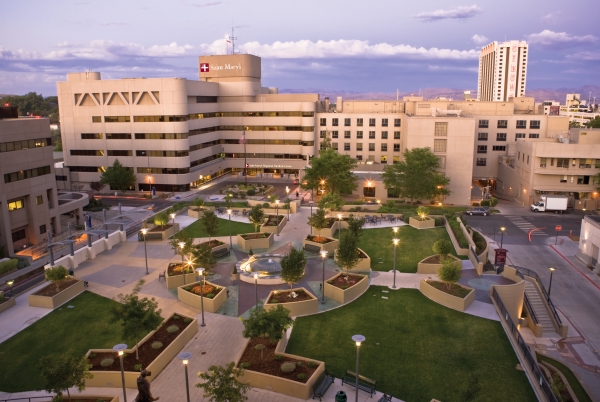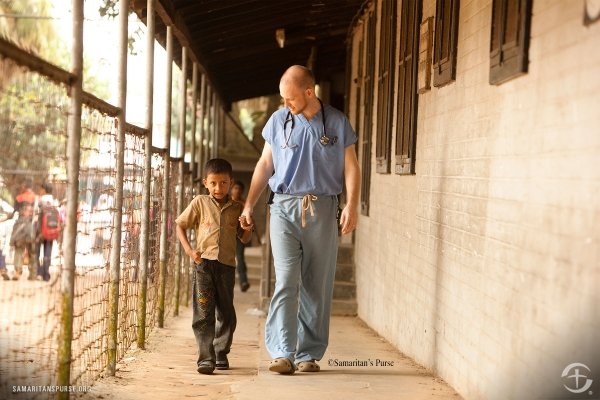
Saint Michael’s Medical Center in Newark
“If there was an award for most-improved hospital, Saint Mike’s would own it.”
-The Newark Star Ledger, November 9, 2018
When Prime Healthcare put an offer on Saint Michael’s Medical Center in Newark in 2013, the hospital was struggling financially and millions in debt. Its future was in doubt.
While Prime Healthcare awaited the State of New Jersey’s approval to purchase the hospital, a report by the health consulting firm Navigant commissioned by the state concluded Newark had too many hospital beds and recommended Saint Michael’s closure as an acute care hospital.
The Navigant report sparked anger in a city that had already lost two community hospitals in recent years. Saint Michael’s had been a fixture in Newark since its founding in 1867 by the Franciscan Sisters of the Poor. Through the years, the hospital never wavered from its original mission of serving the sick and the poor.
A grassroots coalition led by local ministers formed to save the hospital. They joined with elected officials and the hospital’s labor unions to pressure the state to approve the sale to Prime Healthcare. In addition to holding rallies outside the hospital, the coalition generated some 50,000 signatures on petitions that were delivered to the governor’s office.
With state approval still uncertain after more than 2 1/2 years, the 358-bed hospital in August 2015 filed for Chapter 11 bankruptcy protection.
During that period, Saint Michael’s continued to pay its employees and serve its community, but the uncertainty surrounding the hospital’s future began to take a toll as doctors left and the census fell. But Prime Healthcare remained committed to save Saint Michael’s.
As part of the bankruptcy proceedings, the hospital was put out to bid. Prime Healthcare upped its initial offer, outbidding another hospital company. As part of its offer, Prime Healthcare also agreed to increase its investment from $25 to $50 million to upgrade technology and services and continue to modernize the hospital.
Prime Healthcare also agreed to keep Saint Michael’s open as a full-service acute care hospital and outpatient facility providing all of its existing services for a minimum of five years, hire substantially all 1,400 hospital employees, maintain or increase current levels of charity care, and maintain existing health insurance contracts.
With those assurances in place, the state finally approved the sale to Prime Healthcare in the spring of 2016.
Prime Healthcare immediately began rebuilding Saint Michael’s, hiring veteran healthcare executive Robert Iannaccone as CEO. Since Prime Healthcare took over, Saint Michael’s has invested $31.6 million on capital investments.
However, as a result of the bankruptcy, Saint Michael’s stopped submitted surveys to the Leapfrog Group. In the spring of 2016, the hospital received an “F” from Leapfrog. The team Prime Healthcare put in place immediately tackled patient safety, and Saint Michael’s grades improved each year. In the Fall of 2018, the hospital earned its first “A” from Leapfrog.
“Under Prime Healthcare’s ownership, Saint Michael’s had the resources needed to achieve an entirely new level of focus on patient quality and safety,” Iannaccone said. “From the moment Prime Healthcare took ownership, patient safety and continuous quality improvement were the top priority.”
The hospital is also rebuilding its specialty services, including cardiology, for which it had always been a state leader. Saint Michael’s performed the first open heart surgery and cardiac angioplasty in New Jersey. Recently, Saint Michael’s was named one of America’s 100 Best Hospitals for cardiac care by Healthgrades.
The Rev. Dr. Ronald Slaughter, who lead the coalition to save the hospital, was appointed chair of the hospital’s local governing board. He appreciates Prime Healthcare’s commitment to keeping the hospital open for an underserved population.
“We are fortunate to have a community hospital of this caliber to meet the healthcare needs of our community,” Slaughter said.
![PrimeMasterLogo_PMS-216[2]](https://www.primehealthcare.com/wp-content/uploads/2022/05/PrimeMasterLogo_PMS-2162.png)



